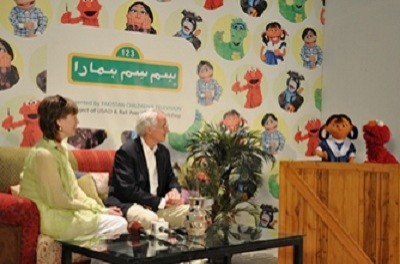'Sesame Street' In Pakistan? Not Anymore, As U.S. Cancels Funding

The U.S. has cancelled millions of dollars in funding for a project to develop a Pakistani version of the popular American children's educational television program Sesame Street, following allegations of corruption against the local puppet theater partnering on the project.
U.S. Embassy spokesperson Robert Raine announced Tuesday that the U.S. Agency for International Development would cease payment of a $20 million pledge to the Pakistan-based Rafi Peer Theater Workshop for the project, though he did not provide any further details.
USAID announced its support for the project in October 2010, citing its efforts to improve education in Pakistan, where it estimates 20 million children, roughly one-third of the school-age population, do not receive basic education. It was also meant to promote tolerance and cultural diversity in a country plagued by sectarian violence.
The program, titled Sim Sim Hamara, which aired its first season last December, featured the shows' iconic fuzzy and friendly red monster Elmo, along with a host of new characters geared toward a young Pakistani audience, including a singing crocodile and a donkey who dreams of being a pop star.
Along with language and numeracy skills, the educational program promotes basic life skills, healthy habits, mutual respect and understanding, and a lifelong love for learning, the USAID's Pakistan office said in a statement in April, praising the show.
The programs have not only been appreciated by school children and teachers, but critics as well who have called 'Sim Sim Hamara' a mesmerizing reflection of national culture, regional flavors, and a mix of urban and rural Pakistan.
Rafi Peer, partnering with Sesame Street's original American creators, was commissioned to produce three seasons, a total of 78 episodes, but has only finished its first season as USAID announced the cessation of funding amid allegations of financial improprieties.
Pakistani newspaper Pakistan Today reported Monday that Rafi Peer had misappropriated funds for personal use, overcompensated family members given privileged positions on the program, and saddled the show with delays due to financial mismanagement and poor planning.
Rafi Peer has denied the allegations, saying that USAID cut its funding after agreeing to pay out $10 million by Sept. 30, because additional funds have dried up, Pakistan Today reported.
Rafi Peer is proud of its association with the project and of the quality of children's educational television programming created within Pakistan as a result, the group told the Associated Press in a statement.
[T]he information regarding suspension of aid is nothing more than a rumor, Rafi Peer spokesperson Faizaan Peerzada told Pakistan Today.
The suspension of funding does not mean that the 'Sim Sim Hamara' program will end ... it just means that the USAID participation in the program has concluded, a public information officer at the U.S. consulate said. USAID constantly reviews programs to make sure they are efficient and have maximum impact.
© Copyright IBTimes 2024. All rights reserved.





















